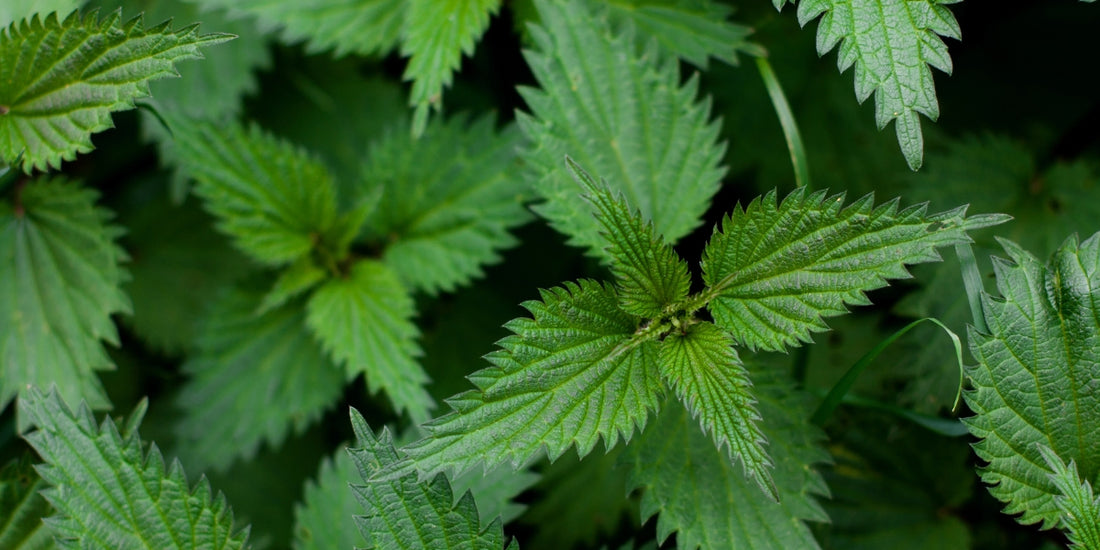Spring is a busy time for hedgerow herbalists. The riverbanks and meadows are bursting with green leafy delights and the house becomes full of drying bundles of herbs and jars of herbs macerating in alcohol or infusing in almond oil in preparation to make remedies. These include nettles, dandelion, comfrey and cleavers (‘sticky soldiers’).
Plants ready to harvest each season often reflect the health and wellbeing needs of people at that time. Spring provides a wealth of detoxifying, nutrient-rich plants great for ridding the body of post-winter sluggishness and conditions that may arise in spring. Hay fever often begins at this time and can last throughout the summer.
I was taken on a weekend break one spring to a beautiful setting: a log cabin in the middle of a magical wood. It wasn’t long before my eyes started streaming and puffing up. My chest became tight, making breathing difficult, and my nose was running. I was experiencing the classic symptoms of hay fever, triggered when the body produces an excess of histamine in response to allergens such as airborne pollens, dust mites, animal hairs and feathers.
After several hours I went down to the stream to rinse my face in the fresh, cool water. On the way, I noticed bright green stinging nettles growing in abundance so I picked a large handful of the fresh tips. Back in the cabin I made a large steaming pot of nettle tea. Drunk over an hour, it gave me three hours of total relief from the symptoms… It was amazing.
Nettles are heating and drying to the body and are therefore said to be ruled by the planet Mars. It is interesting that nettles are often used for a lot of hot, dry conditions.
Nettles can help to calm the histamine reaction of hay fever, drying up mucosal secretions. They can also help with eczema, dermatitis, rhinitis – basically anywhere there is inflammation and heat.
I have seen pulped nettles (mashed between two stones) help soothe stings when placed on the site of prickling.
Nettles are said to be a nutrient-rich source of iron and other minerals. A friend told me about going to her grandma’s every spring and collecting nettles and dandelion leaves for a nourishing, cleansing spring soup. Nettles have been used in this way for centuries.
With this in mind, nettles are a great addition to any spring herbal tea or soup. Getting nourished in spring is something the whole family can do through using spring green herbs in daily meals. Boosting nutrients from Nature’s harvest after a long winter of root vegetables and hibernation! Getting everyone together to harvest the nettles and help prepare a soup makes it fun, and the soup is always tasty.
Culpeper, a 16th-century English herbalist, tells us that the nettle “is hot and dry, and you know as well that winter is cold and moist; then you may know as well the reason why nettle-tops eaten in the spring consume the phlegmatic superfluities in the body of man, that the coldness and moistness of winter hath left behind”.
It’s a good idea to wear thick gloves for nettle picking. That way the children can have a go too. Find a patch away from busy roads, take a basket and pick the fresh tips. Nettles are commonly found and grow easily, but be sensitive to leave enough of the herb to grow back.
Spring nettle tea
I like to use dandelion leaves and cleavers with nettle in my spring tea. They are more cooling in nature and complement the heat of the nettles. For children I use just a small pinch of each herb in a pot to make a weaker tea.
Nettle soup
Sauté an onion and three crushed garlic cloves in some oil, add half a head of celery and two potatoes, cover with water, bring to the boil, simmer until soft, then add a bowl of freshly gathered nettle tips (preferably the leaves separated from the stem to avoid the stringy stems jamming the blender blades). Add some chives and parsley (optional – feel free to experiment with other herbs) and a stock cube. Allow to simmer for a few more minutes and then blend with salt and pepper to taste.
____
 Fiona Heckels is one of the Seed SistAs, herbalists, eco-activists, writers, performers and speakers. Authors of The Sensory Herbal Handbook and Poison Prescriptions, they travel far and wide teaching about plant medicine, while running the community interest company Sensory Solutions Herbal Evolution. Join them in their Coven of Herbal Secrets, or sign up for their newsletters and follow them on social media. seedsistas.co.uk and on Instagram @seed_sistas
Fiona Heckels is one of the Seed SistAs, herbalists, eco-activists, writers, performers and speakers. Authors of The Sensory Herbal Handbook and Poison Prescriptions, they travel far and wide teaching about plant medicine, while running the community interest company Sensory Solutions Herbal Evolution. Join them in their Coven of Herbal Secrets, or sign up for their newsletters and follow them on social media. seedsistas.co.uk and on Instagram @seed_sistas
____
Published in issue 23. Accurate at the time this issue went to print.



